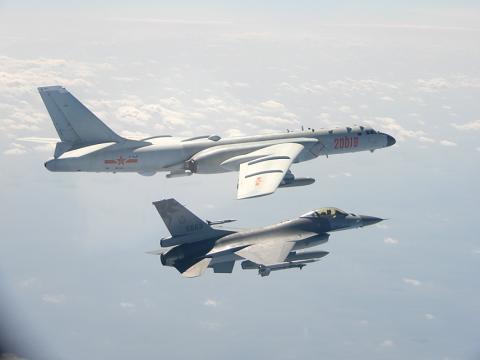The air force on Monday scrambled to warn off approaching Chinese jets, the first time they were spotted near Taiwan’s air space at night, the Ministry of National Defense said.
Taiwan has repeatedly said that China has stepped up its drills near the nation when it should be focusing its efforts on combating the spread of COVID-19.
An unspecified number of Chinese J-11 fighters and KJ-500 airborne early warning and control aircraft flew into the waters southwest of Taiwan for nighttime exercises, the ministry said late on Monday.

Photo: EPA-EFE
They came close to Taiwan’s air defense identification zone at about 7pm, ministry spokesman Major General Shih Shun-wen (史順文) said.
“After our air reconnaissance and patrol aircraft responded appropriately, and broadcast [an order] to drive them away, the [Chinese] communist aircraft flew away from our air defense identification zone,” he said.
The maneuvers were part of the Chinese squadron’s nighttime training mission, the ministry said.
The military keeps close watch on the Taiwan Strait and its environs to ensure the nation’s security, and people have no cause for alarm, it said.
The last time that the Chinese military conducted a similar mission near Taiwan’s airspace was on Feb. 28, when an unspecified number of Chinese H-6 bombers flew over the waters southwest of Taiwan, according to ministry records.
There was no immediate comment from China’s military on the latest drills.
China has been flying what it calls “island encirclement” drills on and off since 2016 when President Tsai Ing-wen (蔡英文) first took office.
The COVID-19 pandemic has worsened already poor relations between Taiwan and China, with the two sides accusing each other of spreading fake news, and Taiwan particularly angered by Beijing blocking its access to the WHO.

CHAOS: Iranians took to the streets playing celebratory music after reports of Khamenei’s death on Saturday, while mourners also gathered in Tehran yesterday Iranian Supreme Leader Ayatollah Ali Khamenei was killed in a major attack on Iran launched by Israel and the US, throwing the future of the Islamic republic into doubt and raising the risk of regional instability. Iranian state television and the state-run IRNA news agency announced the 86-year-old’s death early yesterday. US President Donald Trump said it gave Iranians their “greatest chance” to “take back” their country. The announcements came after a joint US and Israeli aerial bombardment that targeted Iranian military and governmental sites. Trump said the “heavy and pinpoint bombing” would continue through the week or as long

TRUST: The KMT said it respected the US’ timing and considerations, and hoped it would continue to honor its commitments to helping Taiwan bolster its defenses and deterrence US President Donald Trump is delaying a multibillion-dollar arms sale to Taiwan to ensure his visit to Beijing is successful, a New York Times report said. The weapons sales package has stalled in the US Department of State, the report said, citing US officials it did not identify. The White House has told agencies not to push forward ahead of Trump’s meeting with Chinese President Xi Jinping (習近平), it said. The two last month held a phone call to discuss trade and geopolitical flashpoints ahead of the summit. Xi raised the Taiwan issue and urged the US to handle arms sales to

A magnitude 5.6 earthquake struck off the coast of Yilan County at 12:37pm today, with clear shaking felt across much of northern Taiwan. There were no immediate reports of damage. The epicenter of the quake was 16.9km east-southeast of Yilan County Hall offshore at a depth of 66.8km, Central Weather Administration (CWA) data showed. The maximum intensity registered at a 4 in Yilan County’s Nanao Township (南澳) on Taiwan’s seven-tier scale. Other parts of Yilan, as well as certain areas of Hualien County, Taipei, New Taipei City, Taoyuan, Hsinchu County, Taichung and Miaoli County, recorded intensities of 3. Residents of Yilan County and Taipei received

Taiwan has secured another breakthrough in fruit exports, with jujubes, dragon fruit and lychees approved for shipment to the EU, the Ministry of Agriculture said yesterday. The Animal and Plant Health Inspection Agency on Thursday received formal notification of the approval from the EU, the ministry said, adding that the decision was expected to expand Taiwanese fruit producers’ access to high-end European markets. Taiwan exported 126 tonnes of lychees last year, valued at US$1.48 million, with Japan accounting for 102 tonnes. Other export destinations included New Zealand, Hong Kong, the US and Australia, ministry data showed. Jujube exports totaled 103 tonnes, valued at